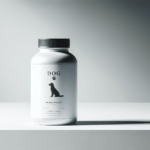
Supporting your dog’s health is a journey filled with love, responsibility, and knowledge. In “Supporting Your Dog’s Health: Essential Supplements and Care Tips,” you’ll uncover a treasure trove of information on how to keep your furry friend at their best. Whether it’s choosing the right natural remedies, understanding the benefits of omega-3 fatty acids for skin and coat health, or selecting the best joint supplements like glucosamine and chondroitin for your senior dog, this guide will help you navigate the world of canine wellness. Aimed at ensuring optimal health and well-being for dogs of all ages and breeds, this article provides practical advice and tips so you can support your canine companion with the highest quality care. Have you ever wondered what kind of care your dog needs every day to stay happy and healthy? Taking proper care of your furry friend goes beyond just providing food and water. Your dog relies on you for regular check-ups, exercise, mental stimulation, and sometimes even supplements to support their health. Whether you have a young puppy or an older dog, this guide will help you understand the essential aspects of canine care and the importance of supplements.

Daily Care Basics
Nutrition
Proper nutrition is the cornerstone of your dog’s health. A balanced diet provides the necessary nutrients for overall wellness. Talk to your vet to determine the best type of food for your dog’s breed, age, and activity level. Look for dog food with the AAFCO seal, which guarantees it meets established nutritional standards.
Hydration
Always ensure your dog has constant access to fresh, clean water. Proper hydration supports all bodily functions and helps maintain a healthy coat and skin.
Exercise
Exercise is crucial for maintaining your dog’s physical and mental health. Aim for at least 30 minutes to 2 hours of physical activity per day, depending on your dog’s breed and age. Play fetch, go for walks, or engage in agility training to keep your dog fit and happy.
Grooming
Regular grooming helps keep your dog’s coat healthy and free from mats and tangles. It also provides a good opportunity to check for any abnormalities, such as lumps or skin issues. Depending on your dog’s breed, you might need to groom them weekly or even daily.
Veterinary Check-ups
Regular vet visits are crucial for maintaining your dog’s health. Annual check-ups can catch potential health issues early and ensure your dog is up-to-date on vaccinations.
Importance of Supplements
Sometimes, even the best diets lack certain nutrients essential for your dog’s well-being. This is where supplements come into play.
Types of Dog Supplements
Different supplements address various health concerns. Here are some common types:
- Multivitamins: Cover a broad range of essential nutrients.
- Omega-3 Fatty Acids: Great for skin, coat, and joint health.
- Probiotics: Support digestive health.
- Glucosamine and Chondroitin: Excellent for joint health, especially in senior dogs.
Benefits of Supplements
Supplements can fill nutritional gaps and support specific health concerns:
- Joint Health: Glucosamine and chondroitin can help maintain cartilage and support hip and joint health, particularly beneficial for older dogs or breeds prone to joint issues.
- Skin and Coat Health: Omega-3 fatty acids can make a significant difference in maintaining healthy skin and a shiny coat.
- Digestive Health: Probiotics can improve gut health, reducing issues like diarrhea and constipation.
- Overall Health: Multivitamins provide a range of essential nutrients that may be missing from your dog’s diet.
Popular Canine Health Supplements
Multivitamins
A multivitamin can offer a broad spectrum of nutrients, making sure your dog receives the essential vitamins and minerals necessary for healthy growth and development.
Omega-3 Fatty Acids
Found in fish oils, omega-3 fatty acids support not just skin and coat health but also cardiovascular and joint health. They’re particularly beneficial for dogs with inflammatory conditions.
Glucosamine and Chondroitin
Often found together, these supplements are excellent for maintaining joint health. They are particularly useful for older dogs who may be experiencing arthritis or other joint-related issues.
Probiotics
Probiotics can help maintain a healthy digestive system by promoting a balanced gut flora. They are especially useful for dogs with digestive problems like diarrhea or constipation.
Skin and Coat Supplements
These often contain a blend of vitamins and nutrients aimed at supporting healthy skin and a shiny, luxurious coat.
Dental Health Supplements
Dental chews and other supplements can help maintain oral health, reducing the risk of gum disease and bad breath.
Natural Remedies
If you’re looking to support your dog’s health naturally, there are several remedies to consider.
Herbal Supplements
Herbs like turmeric and ginger can be beneficial for joint health due to their anti-inflammatory properties.
Organic Products
Organic dog foods and supplements ensure your dog isn’t ingesting harmful pesticides or synthetic chemicals.
Natural Dental Remedies
Chewing on raw bones or specially designed dental chews can help keep your dog’s teeth clean and gums healthy naturally.

Tips for Choosing Supplements
When selecting supplements, quality matters. Here are some tips to help you choose the best ones for your dog.
Look for the NASC Quality Seal
The National Animal Supplement Council (NASC) Quality Seal ensures the product has been manufactured according to the highest standards of quality.
Consult Your Veterinarian
Always consult your vet before introducing new supplements into your dog’s diet. They can recommend the best options based on your dog’s specific health needs.
Check Ingredients
Opt for supplements with the highest quality ingredients. Avoid those with artificial fillers and preservatives.
Manufacturer’s Reputation
Choose supplements from well-known and reputable manufacturers. Reviews and recommendations from other pet owners can be invaluable.
Specific Health Needs
Different dogs have different health needs. Whether your dog is young, active, or a senior, there are bespoke supplements designed to support their unique requirements.
Common Health Issues and How Supplements Can Help
Joint Issues
As dogs age, they often face joint problems. Supplements containing glucosamine, chondroitin, and MSM can help support joint health and mobility.
Skin and Coat Problems
Dry skin, itching, and a dull coat can often be addressed with omega-3 fatty acids and vitamin E supplements, which promote healthy skin and a glossy coat.
Digestive Issues
Dogs with digestive problems can benefit from probiotics. These will help maintain a healthy gut flora, improving overall digestive health.
Immune System Support
Elderberry, vitamin C, and other antioxidants can support a robust immune system, helping your dog fend off illnesses more effectively.

Conclusion
Supporting your dog’s health involves a holistic approach combining proper nutrition, regular vet visits, exercise, grooming, and the strategic use of supplements. By following these tips and consulting with your veterinarian, you can help ensure your dog lives a long, happy, and healthy life. Always remember that while supplements can be beneficial, they should not replace a balanced diet or regular veterinary care.
So, take the time to understand your dog’s unique needs and invest in products that will support their overall well-being. Your dog gives you unconditional love and loyalty; giving them the best care in return is the least we can do.







